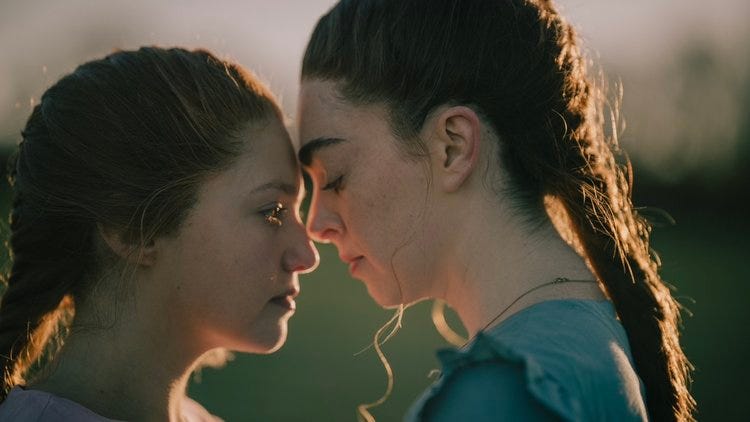don't let your husband stop you from finding your wife: Sister Wives (2024)
The short film winner even the manic pixie dream queers are sleeping on
Sister Wives (2024) directed by Louisa Connolly-Burnham is a short film about two women who live in a fundamentalist, polygamous society. When their husband Jeremiah (Michael Fox) is called away on a mission, Kaidence (Louisa Connolly-Burnham) and Galilee (Mia McKenna-Bruce) start to develop feelings towards each other, in a society where being queer is considered a cardinal sin. Although not explicitly stated, Sister Wives is set within the Fundamentalist Church of Jesus Christ of Latter-Day Saints (FLDS), a group that broke away from its Mormon origins due to differing stances on polygamy (mainstream Mormonism rejected polygamy in 1890), shares PinkNews.
This film has won sixteen awards and been nominated for nine more, including, but not limited to, winning Best LGBTQIA+ at the 2024 HollyShorts Film Festival and both Best British Short and the Audience Award at the 2024 Iris Prize Festival. When asked about her awards and nominations, Connolly-Burnham says, she’s “just a girl from Birmingham … it’s mad.”
Director: Louisa Connolly-Burnham
Writer: Louisa Connolly-Burnham
Cast: Mia McKenna-Bruce, Louisa Connolly-Burnham & Michael Fox

If you have watched Portrait of a Lady on Fire (2022), obsessed over it or have it in your Letterboxd top four (like me), chances are you’re going to love this.
Sister Wives opens with Kaidence, who has her back to us as she is cleaning. The camera slowly pans down her back, her brown plait cascading down the centre of her dull blue dress. Remember this detail. It will be important later. She is dressed conservatively and meets her husband coldly when he returns—especially when he breaks his news. We are to become three, he informs. The decision is made without her input, without her agreement. This is a stark reminder to indoctrinate the viewer (voyeur) into their life. We joined today. Galilee is to join tomorrow.
Tomorrow comes after the ‘intimate’ next scene. I say intimate ironically here for there is none between these characters. The coldness from the kitchen scene has frozen the bedroom: midnight hues of freezing blue suffocate the scene. Enter Galilee (Mia McKenna-Bruce) in her wedding frock looking like someone’s rich aunt has played dress-up with her on Say Yes to the Dress.
Now the short has been set up, our two characters are left to their own devices in each other’s company. Upon seeing Kaidence and Galilee interact for the first time with each other, I wondered how Connolly-Burnham was going to show a believable strangers (with some dislike, hate, whatever trope of the sort you want to attach to this) to lovers, albeit forbidden in just twenty-eight minutes. I had not watched The Call Centre, Connolly-Burnham’s 2020 other short film release, prior to this so I didn’t have a point of reference when looking at this film (apart from sad gays yearning; burying your gays; maybe in another life; right person, wrong time—you get the idea—type of tropes).
Yet despite its short run time, their relationship feels natural and quickly evolves with what little time they have left alone. Breaking rules is addictive when you have someone to break them for. Long glances, sharing hairstyles and bolognese go a long way. One fan even confessed:
It was breathtaking to watch these two women, once strangers, soften in the others’ company and empathy. The night before Jeremiah leaves he takes Galilee’s virginity and the next morning she despairingly shows Kaidence the blood she cannot get out. It is here Kaidence’s characters softens for the first time and makes way for a new type of female companionship both characters need. Over the four weeks their husband is away on his mission, the sister wives grow to know and love one another. It is during one of these moments that I was jumpscared by a mobile phone.

Yet nothing lasts forever, and Jeremiah returns home and they are caught after sharing an imitate night.
I love the use of lighting props, particularly at the dining scenes. Initially, only Jeremiah and Galilee are lit, leaving Kaidence in the dark. Her coldness and lack of autonomy abandon her to the shadows. I find it interesting to note that Jeremiah is lit by the candle shared by everyone on the table. It’s lit with purpose yet Galilee is lit by a lamp. Electricity exists? So far it’s assumed that this family (albeit, unconventional) live in a rural historical society, with the bare essentials and church. Of course, it could be fuelled by something else, but a later scene implies that this is not the case.

After Jeremiah returns Galilee like an unwanted object he’s finished with, the lighting is more sombre. This shot is uncomfortable, it’s off centre deliberately to show the supposed return to normalcy, except this is not the case. Kaidence is lit by the candle this time; no longer centred on the table, she is left yearning for Galilee and the warmth she brought. She has awoken from the suppression since marrying Jeremiah at fourteen, and she decides to act.

When watching films, I tend to focus on the visuals (as evident above), but midway through I noticed the score was minimal. I was excited to listen to the score, if it was even available on streaming services, to write my own sapphic yearning stories too and then I realised: was there a score? Normally, I pick up on bits and pieces, my ears attuning to the emotion while hyperfocusing on the characters exploration of their new found relationship.
I was wrong, of course. Connolly-Burnham only scores the scenes where Kaidence and Galilee are smiling, momentarily free of societal constraints and homophobia. The composer is by James New, the other half of alt folk-indie duo Virens with Connolly-Burnham herself. Sound design is by Molinare (Killing Eve and Heartstopper, Season 2). Queer euphoria. It’s a pure, wonderful thing, and I think Connolly-Burnham captures this well despite it being her first venture into LGBTQIA+ cinema. However, I do wish in these secret moments, the colour grading was more vibrant to really send home these exciting, but forbidden feelings: something more akin to the vibrancy of Portrait of a Lady on Fire.
Since the score isn’t on Spotify, I’ve made my own OST for you to listen to when you cannot get this film out of your head (like me!)
Connolly-Burnham teased on Instagram about a full feature length also being in the works. Rumour is Mia McKenna-Bruce is set to reprise her role too. PinkNews excitedly share that it will “film this summer”.
Another great thing is that you can watch it too! Thimble Films (Connolly-Burnham’s own production company) uploaded the full film onto YouTube and Vimeo! I would love to know your thoughts! I, for one, will be front in line when the full feature length version is released.
Love from,
Hannah
(ig, spotify, goodreads, letterboxd)
Resources:
https://letterboxd.com/film/sister-wives/
https://www.louisaconnollyburnham.com
https://www.imdb.com/title/tt26227192/
https://letterboxd.com/loulovesfilm/
https://www.thepinknews.com/2025/01/14/bafta-long-listed-film-sister-wives-queerness-fundamentalist-latter-day-saints/
https://www.girlsinfilm.net/videos/sister-wives










so underrated! still waiting for a girl to cook a spag bol for me